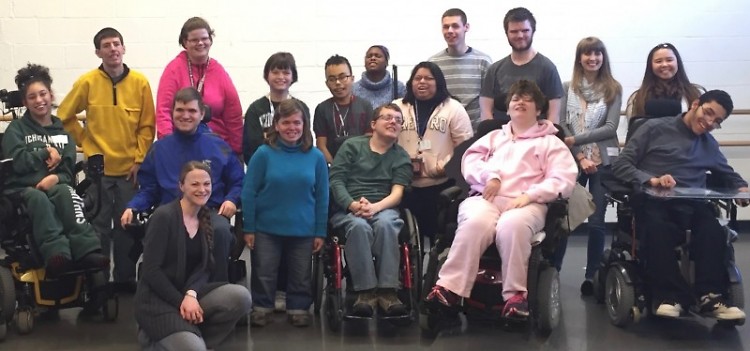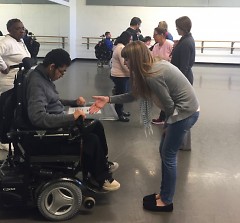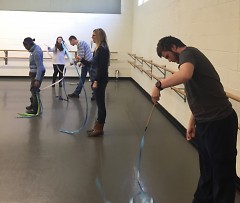On an early February morning, Grand Rapids Public School transition students meet at the Grand Rapids Ballet for their last dance class. The students in this program have physical, visual, and cognitive disabilities—most have limited physical mobility, and many are in wheelchairs.
ACT’s Arts & Mentoring classes are offered to students at GRPS’s Community Transition Campus (CTC). The classes run for three weeks, followed by a site visit where they get to see art in action in the community. The classes are developed collaboratively with the students, CTC staff, and ACT based on what the students would like to learn. This group in particular chose a class on dance because they wanted to be independent and have access to their creativity.
For the first two weeks, the students have been gaining bodily control through specific dance routines and movements. Today, the final teaching session, the goal is to increase the students’ independence through interpretative dance. Molly, the teaching artist for this class, instructs the students to just dance like “the music makes you feel”—to follow their own unique movement.
Molly starts a slow, emotional song—“Halo” by Beyoncé. The class loves it. Some start to sing; others immediately sway to piano music and clap along. It seems that they are just having fun with a song that they love, but it becomes much more.
As the music swells, the dancers seem to get swept into the song, feeling the weight of each long or high note. They start making larger and smoother movements—some moving their arms in fluid motions around them while others nod their heads with the beat. Each student is moving in a way that is completely unique to how they feel. Regardless of how much movement they have, every student dances to the best of their ability and independent from any dance instruction.
Afterwards, Molly praised the students: “The students did great with the expressive dance concepts,” she said, reflecting on their interpretive dance lesson. “I saw a lot of creativity when they came up with their own dance moves.”
Teachers and ACT staff alike who were a part of this class felt the tremendous growth in the final lesson. “I saw them grow more with each class,” shared Sara Lovelace, an ACT intern who works with the students regularly. “You could see they were becoming more confident in themselves and let themselves have fun.”
At the end of the class, the students gathered around Molly to talk about their final meeting. One student said proudly, “Once I got it down, I was able to do the movements well.” Another student with limited mobility shared, “I used my arms in many different ways. I want to do it again.”
This Arts & Mentoring program has come to a close, but the students have grown to achieve new goals over the past four weeks. They have gained confidence in their abilities through an art form that many assumed they would never be able to try.
Written by Annabelle Miller, ACT Writing and Public Relations Intern
The Rapidian, a program of the 501(c)3 nonprofit Community Media Center, relies on the community’s support to help cover the cost of training reporters and publishing content.
We need your help.
If each of our readers and content creators who values this community platform help support its creation and maintenance, The Rapidian can continue to educate and facilitate a conversation around issues for years to come.
Please support The Rapidian and make a contribution today.


